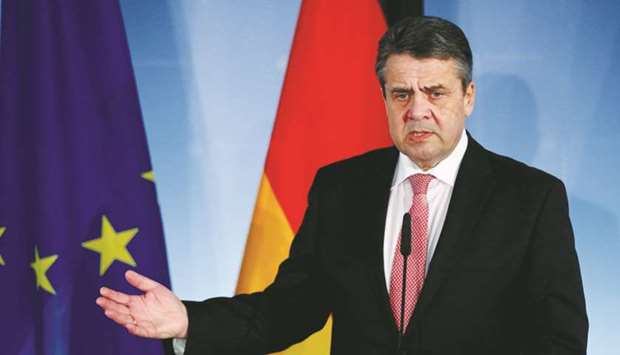Deutsche Bank AG nominated former German Foreign Minister and Vice-Chancellor Sigmar Gabriel to the supervisory board, adding a top career politician as it seeks to improve relations with investors and the government following a long decline in the stock.
Gabriel, who held senior roles in Chancellor Angela Merkel’s cabinet for nine years and led the Social Democratic Party from 2009 to 2017, will stand for election by shareholders at the next annual general meeting, Deutsche Bank said on Friday.
The 60-year-old is well-connected in the German elite, and he knows Deutsche Bank’s largest investors. The lender had been looking for a new board member since Juerg Zeltner in October was pushed to resign by regulators over a potential conflict of interest, an embarrassing setback for chairman Paul Achleitner, who heads the committee in charge of such appointments.
“We are experiencing a challenging geopolitical, economic and social era in which a global bank has to face completely new expectations and demands,” Achleitner said. “Sigmar Gabriel will make a unique contribution and complement the expertise of our supervisory board.”
Deutsche Bank rose 2.1% at 2:18pm. It’s the best-performing bank stock in Europe this year, having gained 13%, though it remains more than 90% below its peak before the financial crisis.
Gabriel has had a long career in national politics, but next to no experience in banking. He knows the Qataris from his time as a prime minister in the state of Lower Saxony, when he sat on the supervisory board of Volkswagen AG. Shortly before he left his seat in parliament last year, there had been rumours he would become head of Germany’s influential car lobby group VDA.
He’s the latest in a long list of lawmakers seeking a lucrative role in business after their political careers. Former Finance Minister Peer Steinbrueck is advising Dutch lender ING Groep NV. Former Defence Minister Rudolf Scharping moved on to advise Cerberus Capital Management. Most prominently perhaps, ex-Chancellor Gerhard Schroeder is chairman of Nord Stream 2, the controversial gas pipeline project linking Germany and Russia that’s drawn the ire of the US.
And the revolving door works both ways. Friedrich Merz, the former parliamentary leader of the Christian Democrats and their sister party, has been trying to return to politics after becoming chairman of BlackRock Inc’s German unit in 2016. The former chairman of Goldman Sachs Group Inc in Germany, Joerg Kukies, is now deputy to Finance Minister Olaf Scholz. He’s kept close contact with Deutsche Bank and promoted a national champion through a tie up between Deutsche Bank and Commerzbank AG.
As a politician, Gabriel was occasionally critical of banks. In 2011, he told Spiegel magazine that German lenders should separate investment banking and commercial banking, and that the securities units should not receive any government aid in the wake of the financial crisis. In 2016, when he was Merkel’s Vice Chancellor, he criticised Deutsche Bank for building its business on the kind of “speculation” that the firm was now blaming for the decline in its shares.
“I don’t know whether to laugh or be angry that the bank that declared speculation to be its business model now declares itself a victim of speculators,” he said at the time. “I’m worried about the people employed by Deutsche Bank.”
Under chief executive officer Christian Sewing, the lender has rebuilt relations with Berlin after the German government increasingly distanced itself from the bank in the aftermath of the 2008 financial crisis. The bank’s failed merger talks with Commerzbank last year happened in part at the urging of the government, people familiar with the matter have said.
The relationship between the chairman Achleitner and the Qatari investors, meanwhile, has soured in recent years as the stock declined. Some representatives of the Qatari royal family have taken the unusual step of directly approaching candidates to gauge their interest in replacing the chairman, Bloomberg reported last year.

German Foreign Minister Sigmar Gabriel gestures after a meeting in Berlin. Gabriel, who held senior roles in Chancellor Angela Merkel’s cabinet for nine years and led the Social Democratic Party from 2009 to 2017, will stand for election by shareholders at the next annual general meeting, Deutsche Bank said on Friday.
